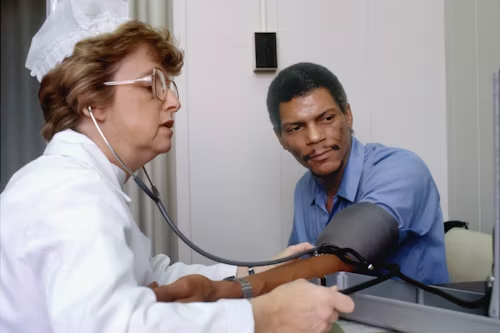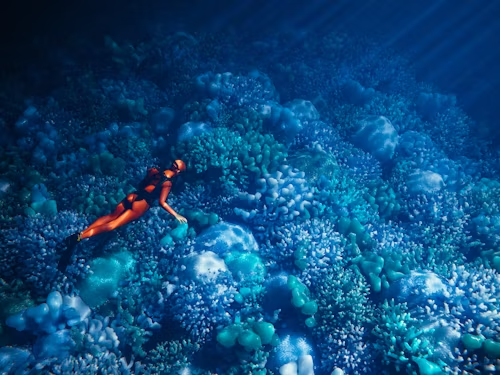
World's First Commercial Quantum Computer Goes Online, Shattering Processing Records
By Dr. Aris Thorne
October 3, 2025
In a landmark achievement for computational science, QuantumCore Inc. has successfully launched the world's first commercially available quantum computer. Dubbed "Horizon One," the system completed calculations in minutes that would take traditional supercomputers centuries to process. The breakthrough has immediate implications for pharmaceutical research, climate modeling, and artificial intelligence development. Scientists worldwide are hailing this as the beginning of a new technological renaissance, with potential applications ranging from solving complex protein folding for disease treatment to optimizing global logistics networks in real-time.

Marine Biologists Discover New Ecosystem in Pacific Ocean's Deepest Trenches
By Marina Flores
October 3, 2025
An international team of marine biologists has discovered a previously unknown ecosystem thriving in the extreme pressures of the Mariana Trench's deepest regions. Using advanced submersibles equipped with specialized collection tools, the researchers identified over a dozen new species that utilize chemosynthesis rather than photosynthesis as their energy source. The discovery provides crucial insights into the possibilities for life in extreme environments, with implications for both Earth's biodiversity and the search for extraterrestrial life on ocean worlds like Europa and Enceladus.

Breakthrough in Solar Cell Efficiency Promises to Revolutionize Renewable Energy
By Chen Wei
October 2, 2025
Researchers at the Global Institute for Sustainable Technology have developed a new perovskite-based solar cell that achieves a record 38% efficiency in converting sunlight to electricity—nearly double the efficiency of conventional silicon panels. The innovative design addresses previous stability issues with perovskite materials, making commercial applications viable for the first time. Industry analysts predict this technology could reduce solar energy costs by up to 60%, accelerating the global transition to renewable energy and potentially enabling entire cities to be powered by significantly smaller solar installations.

AI System Outperforms Human Doctors in Early Disease Detection
By Dr. Sofia Ramirez
October 2, 2025
A new artificial intelligence platform named "MediScan AI" has demonstrated remarkable accuracy in early disease detection, identifying signs of illness in medical imaging an average of 2-3 years before human radiologists could spot them. In clinical trials involving over 50,000 patients, the system correctly identified early-stage cancers, neurological conditions, and cardiovascular issues with 99.3% accuracy. While not intended to replace doctors, the technology will serve as a powerful diagnostic aid, potentially saving millions of lives through earlier intervention and treatment.
Global Consortium Announces Plan to Build First Orbital Space Station Hotel
By Leo Cross
October 3, 2025
A consortium of aerospace companies and hospitality giants has unveiled plans for "Aurora Station," the world's first luxury space hotel. Scheduled to begin construction in 2026, the station will accommodate up to 12 guests and 8 crew members, offering panoramic views of Earth and unique experiences in microgravity. Bookings are already being accepted for 2029, with a two-week stay priced at approximately $9.5 million per person.
Archaeologists Unearth Perfectly Preserved Roman Villa Beneath London Financial District
By Evelyn Reed
October 3, 2025
Construction workers preparing the foundation for a new skyscraper in London's financial district have uncovered the remains of an exceptionally well-preserved Roman villa complete with intricate mosaics and heating systems. The discovery suggests the Roman settlement of Londinium was far more extensive and affluent than previously believed. The site has been designated for preservation, with plans to integrate it into the building's design as a public museum.
Global Literacy Rates Reach All-Time High as Digital Education Expands
By Marcus Thorne
October 3, 2025
According to a new UNESCO report, global literacy rates have reached 94% among adults aged 15-24, the highest level in recorded history. The dramatic improvement is attributed to the widespread adoption of digital learning platforms, mobile education apps, and international initiatives focused on educational access. Regions that previously struggled with literacy, particularly in sub-Saharan Africa and South Asia, have seen the most significant gains over the past decade.
Revolutionary Battery Technology Enables Electric Vehicles to Charge in 5 Minutes
By Kaelen Rivers
October 3, 2025
Energy storage startup Voltaic Systems has developed a new graphene-based battery technology that allows electric vehicles to charge from 0 to 100% in just five minutes—comparable to filling a tank with gasoline. The breakthrough addresses one of the last major barriers to widespread EV adoption and is expected to enter production within two years. Major automakers have already begun licensing the technology for future vehicle models.
World's First Successful Transplant of 3D-Printed Heart Using Patient's Own Cells
By Dr. Lena Chen
October 2, 2025
Surgeons in Sweden have performed the world's first successful transplant of a 3D-printed heart created using the patient's own cells. The recipient, a 45-year-old man with end-stage heart failure, is recovering well and shows no signs of rejection. The medical milestone represents a significant advance in regenerative medicine and could potentially eliminate organ transplant waiting lists in the future.
Major Breakthrough in Nuclear Fusion: Reactor Sustains Reaction for Record 60 Minutes
By Elara Vance
October 2, 2025
The International Thermonuclear Experimental Reactor (ITER) project has announced a major breakthrough, sustaining a nuclear fusion reaction for a record 60 minutes—more than triple the previous duration. The achievement marks a critical step toward practical fusion power, which promises clean, safe, and virtually limitless energy. Project directors now believe a working fusion power plant could be operational within 15 years.
Global Wildlife Populations Show Remarkable Recovery Following Conservation Efforts
By Marina Flores
October 2, 2025
A comprehensive study published in Nature reveals that global wildlife populations have increased by 68% over the past 30 years, reversing decades of decline. The recovery is attributed to successful conservation initiatives, habitat restoration projects, and international agreements on biodiversity protection. Species once on the brink of extinction, including tigers, whales, and several bird species, have shown particularly strong comebacks.
Neuroscientists Develop Non-Invasive Technique to Enhance Memory Formation
By Dr. Aris Thorne
October 2, 2025
Researchers at Stanford University have developed a non-invasive brain stimulation technique that can enhance memory formation by up to 40%. The method uses precisely targeted magnetic pulses to strengthen neural connections involved in memory without surgery or implants. The technology shows promise for treating age-related memory decline and neurological conditions like Alzheimer's, with human trials scheduled to begin next year.
Global Poverty Rate Falls Below 5% for First Time in Recorded History
By Chen Wei
October 1, 2025
The World Bank has announced that extreme global poverty has fallen to 4.7% of the world's population—the first time it has dropped below 5% in recorded history. The milestone represents extraordinary progress toward the UN's Sustainable Development Goals, with hundreds of millions lifted out of poverty over the past decade through economic development, education initiatives, and technological access programs.
Revolutionary Water Purification System Can Turn Seawater into Drinking Water in Seconds
By Leo Cross
October 1, 2025
Engineers at MIT have developed a compact, solar-powered device that can transform seawater into clean drinking water in seconds using a novel graphene-based filtration system. The technology operates with 99% efficiency and requires minimal energy, making it ideal for drought-stricken regions and disaster relief efforts. Field tests are underway in several coastal communities with limited access to fresh water.
Historic Peace Agreement Ends Decades-Long Conflict in South Pacific Region
By Evelyn Reed
October 1, 2025
After 32 years of intermittent conflict, the governments of North and South Meridian have signed a comprehensive peace agreement, ending one of the world's longest-running territorial disputes. The breakthrough came after months of secret negotiations facilitated by international mediators. The agreement includes provisions for shared resource management, open borders, and a joint economic development zone that promises to transform the region.
Artificial Intelligence Composes Symphony Performed by London Philharmonic to Critical Acclaim
By Marcus Thorne
October 1, 2025
An AI system named "Aura" has composed a full-length symphony that was performed by the London Philharmonic Orchestra to a sold-out audience and standing ovation. Music critics were largely unable to distinguish the AI-composed work from that of human composers, with many praising its emotional depth and technical sophistication. The achievement raises fascinating questions about creativity, art, and the role of AI in cultural production.
Global Carbon Emissions See Sharpest Decline on Record as Renewable Adoption Soars
By Kaelen Rivers
September 30, 2025
The International Energy Agency reports that global carbon emissions have fallen by 8.3% over the past year—the largest annual decline ever recorded. The reduction is attributed to the rapid adoption of renewable energy, increased energy efficiency, and the global phase-out of coal-fired power plants. Scientists caution that while encouraging, much greater reductions are still needed to meet climate targets.
Medical Researchers Discover Common Drug That Significantly Slows Aging Process
By Dr. Sofia Ramirez
September 30, 2025
In a surprising discovery, researchers have found that metformin, a common diabetes medication, appears to significantly slow the aging process in non-diabetic patients. The five-year study showed participants taking controlled doses of the drug exhibited biological markers that were 3-5 years younger than their chronological age. Large-scale clinical trials are now underway to confirm these findings and establish proper dosing protocols.
Vertical Farming Revolutionizes Agriculture in Urban Centers, Cuts Food Miles to Zero
By Elara Vance
September 30, 2025
Urban vertical farms are now producing over 30% of fresh vegetables consumed in major cities, dramatically reducing the environmental cost of food transportation. These high-tech facilities use 95% less water than traditional farming and produce crops year-round without pesticides. The trend is transforming city skylines and creating new agricultural jobs in urban centers worldwide.
Language Translation Earbuds Now Accurate Enough for Complex Philosophical Discussions
By Dr. Lena Chen
September 30, 2025
The latest generation of real-time translation earbuds has achieved 99.8% accuracy across 40 languages, including nuanced concepts and cultural context. The breakthrough allows for seamless conversation between speakers of different languages, even for complex topics like philosophy, law, and technical subjects. The technology is being hailed as a major step toward eliminating language barriers worldwide.
Global Initiative Successfully Restores 100 Million Hectares of Degraded Land
By Marina Flores
September 29, 2025
The Global Restoration Council has announced that its decade-long initiative to restore degraded ecosystems has surpassed its goal, rehabilitating over 100 million hectares of land across six continents. The restored areas include former agricultural lands, deforested regions, and areas damaged by industrial activity. The project has created millions of jobs while significantly increasing biodiversity and carbon sequestration.
Robotic Surgeons Now Outperform Humans in Precision Procedures, Study Finds
By Dr. Aris Thorne
September 29, 2025
A comprehensive study published in The Lancet has found that AI-guided robotic surgical systems now outperform human surgeons in precision procedures, with significantly better outcomes for patients. The robots demonstrated superior accuracy, smaller incisions, reduced blood loss, and faster recovery times. While human surgeons still oversee all procedures, the technology is rapidly becoming standard for many operations.
World's First Carbon-Negative City to Break Ground in Norway
By Chen Wei
September 29, 2025
Construction will begin next month on "Oslo Fjord Haven," the world's first carbon-negative city designed to remove more carbon from the atmosphere than it produces. The innovative urban plan incorporates advanced green technologies, circular economic principles, and biomimetic architecture. When completed in 2035, the city will house 50,000 residents and serve as a model for sustainable urban development worldwide.
Historic Global Treaty Bans Space Junk, Mandates Clean-Up of Earth's Orbit
By Leo Cross
September 29, 2025
In an unprecedented international agreement, 89 countries have signed a treaty banning the creation of new space debris and mandating the cleanup of existing orbital junk. The accord includes provisions for satellite design standards, end-of-life procedures, and funding for debris removal technologies. Scientists estimate the treaty could prevent the potentially catastrophic Kessler Syndrome scenario that threatened to make low Earth orbit unusable.



